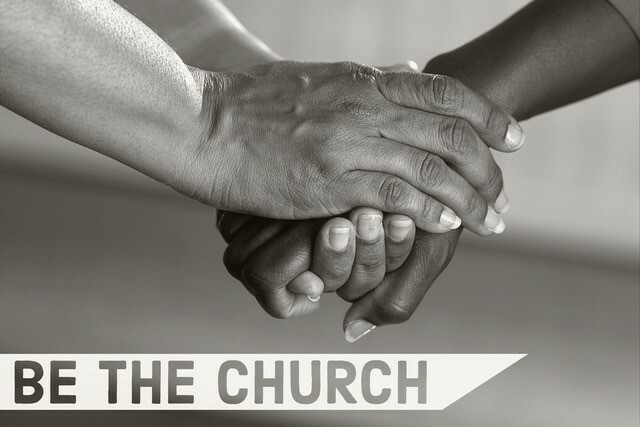Be the Church 7 (Sharing)
Hebrews 1:1-4:1
Be the Church – Part 8
Sharing ~ November 4, 2018
At Trinity, we believe in the miracle-working power of God. Amen? We believe God can heal, deliver, provide, and guide. Because of this belief, we pray for people’s needs:
- We ask God to heal.
- We ask God to deliver.
- We ask God to provide.
- We ask God to guide.
- We ask God to do any number of things on our behalf and on
tehalf of others.
All of that is good and we are happy to pray for such things but below the surface of every prayer is a core belief that one need is more important than any other need in a person’s life.
- Regardless of the circumstances of the moment or the stress and pressure of life’s difficulties, one need reigns supreme.
- Though it may appear to be eclipsed by needs, wants, and desires which feel more pressing, it is always the most important need…and remains so until it has been met.
The most important need in every person’s life is the need to know Jesus Christ as Savior. Let me say that again: the most important need in every person’s life is the need to know Jesus Christ as Savior.
You may wonder why this is the most important need, so let me explain. Every person who has ever lived has been sick with the same deadly disease.
- It is true for us and it was true for our ancestors.
- This disease is so powerful that its effects can be seen and felt mentally, physically, spiritually, and relationally.
- It ruins lives and divides friends and families.
- It promises fulfillment, enlightenment, understanding, happiness, and freedom, but ultimately delivers disillusionment, confusion, misunderstanding, pain, misery, and bondage.
- While many of the symptoms are recognizable from person to person, it also manifests itself in far more ways than we could count.
Sadly, many suffering with the disease are often blind to its existence, power, and hold on them. Some, understanding the disease, still refuse the cure.
What is this dreadful disease? Scripture calls it sin. So, what is sin?
Sin is failure to conform to the moral law of God in action, attitude or nature.[1] Think about it this way: God’s moral law is a line in the sand.
- Sin is crossing the line.
- Sin is the attitude that leads to crossing the line.
- Sin is the very nature within us that produces both the attitudes that lead to crossing the line and the actions of crossing it.
That last idea is an important one.
- If sin is just an act of line crossing, then I may possess the will power and discipline to keep from crossing it.
- If sin is also the attitude that lead to line crossing, I might be able to change my attitude to keep from crossing the line.
- But if sin is part of my nature then there is no way I can escape it because wherever I go, it is right there with me.
I need a cure that will not only deal with my attitudes and actions, but one that will also change my nature—something I cannot do on my own.
There is only one cure for the disease of sin—the blood of Jesus Christ. I realize that sounds gruesome and that it might even sound goofy to, but I think I can explain it so that we can understand.
Scripture says that the sin cannot be forgiven unless blood is shed. I think we understand this though we might not see it right away. People can be wronged or hurt or betrayed or mistreated so badly that there is a saying (from Shakespeare’s Merchant of Venice) which describes the need for payment or retribution – I will have my pound of flesh. Today, that phrase is defined as “something that is owed that is ruthlessly required to be paid back.”
I don’t know about you, but I understand that. If I am wronged, or hurt, or betrayed, or mistreated, my first inclinations are to demand payment…or to return the wrong, hurt, betrayal or mistreatment in kind. I want the person to pay for what they’ve done to me. Does anyone understand what I’m saying? How many would agree that the demand for payment escalates if the wrong, hurt, betrayal, or mistreatment happens to someone I love?
Think of it this way, when people (who are all created in the image of God) suffer from and because of the disease of sin, God says someone must pay—with their life, with blood—because his dearly loved creation has been wronged, or hurt, or betrayed, or mistreated.
God is totally healthy, we call that holiness. And because he is totally healthy, he cannot and will not allow the disease of sin in his presence…and yet people were created for his presence (we call that worship). So, how can sin-sick people come into God’s presence—only by the shed blood of Jesus Christ.
There are only two payment options for sin—we can choose to pay it ourselves or we can choose to accept Christ’s payment on our behalf. The problem with choosing to pay it ourselves is that it requires our blood—not just a pint—but all of it. However, since our blood is tainted with sin, it is not an acceptable form of payment and so we are left dead in our sin and unable to enjoy God’s presence.
The other payment option—the only acceptable one—is for someone to pay the price for us, someone whose blood and nature are not contaminated with sin and the only person who fits that bill is Jesus Christ the Son of God.
God loved us so much that he sent Jesus to pay the penalty for our sin so that we could be acceptable to come into his presence. It is a universal payment meaning it is good for everyone, but only if we claim it. We do that by confessing our sin and asking God to forgive us in light of the payment Jesus made on our behalf.
This morning, I want you to know that God loves and that your sin can be forgiven, and your nature can be changed.
Now, all of that was just an introduction. Not really, but I do need to explain how all of this relates to our theme, “Be the Church.”
At Trinity, we are convinced that life works best when people live in right relationship with God and each other. We believe a right relationship is described in 5 purposes for both life and the church.
- Worshiping
- Growing
- Belonging
- Sharing
- Serving
Today, I’ve talked to you about the reality of sin and the love of God shown through Christ who paid for our sin. If we are going to be the church, we need to share this story with others who need to hear it.
Once we have come to know Christ as Savior, God sends us out to reach others. This is not optional. It is part of the job description for every Christian. You may be tempted to think it’s only my job as the senior pastor, or that it’s only the responsibility of pastors in general, but that isn’t true. As pastors, our job is to prepare you to do fulfill God’s purpose and that includes sharing your faith with others.
We don’t know all the people you know. We don’t go all the places you go. We need you to share the story of God’s amazing grace. There are people on this planet only you will be able to reach because of where you live and what God has made you to be and if just one person will be in heaven because of you, your life will make a difference for eternity.[2] We can help you. We can teach you. We can support you and we can pray for you. But we cannot do it for you.
This task is so important because literally every person’s eternal destiny hangs in the balance. This isn’t a single person in this world who doesn’t need Jesus. No matter how contented or successful people appear to be, without Christ they are hopelessly lost and headed for eternal separation from God.[3]
I love how the writer of Hebrews put in Hebrews 4:1—God’s promise of entering his rest still stands, so we ought to tremble with fear that some of you might fail to experience it, (NLT).
I want you to remember this phrase this week: If I am saved, then I am sent. And I want you to ask God to open doors of opportunity for you to share what He’s done in your life.
Let me pray for you now that those opportunities will come.
[1] Wayne Grudem, Systematic Theology, p. 490.
[2] Rick Warren, The Purpose Driven Life, p. 285.
[3] Warren, 284.
Series Information

In a very real sense, we do not come to church, we are the church. We are to be the hands and feet and love of Jesus to people who often don't even understand that they need him.
